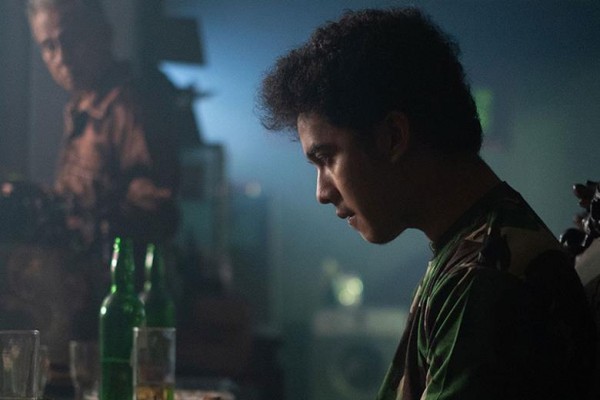-
Maiden (graham foy 2022)
GRAHAM FOY: THE MAIDEN (2022)

A poetic picture of teenage grieving
This beautifully slow, observational, touchingly restrained film from Alberta, Canada follows two high school boys who skateboard and wander the summer together, and then follows one of them when a tragic accident separates them, leaving the remaining one alone. Maiden, named for the tag of the lost boy, touches on the oeuvre of Gus Van Sant sensitively, particularly Paranoid Park, weaving an artisanal magic of its own, capturing a magical mood with slowness.
The boys are the stockier Kyle (Jackson Sluiter), the leader, and his lanky, fuzzy-haired best friend Colton (Marcel T. Jiménez). Their talk is conventional, bland, laced with F-words, ordinary. They agree they have no plans for the next ten years. They emerge as distinct with a respectful little gesture. After they discover a dead cat in a construction space and, wanting to do something kind, carry out some ceremonial act, they decide to set the corpse adrift on a small raft down a river.
After the tragedy Foy follows Colton at school: his inarticulateness with a well-meaning but inept school counselor; a shop teacher's lack of sympathy when he acts out a little; an "enemy's" cruel note; a physical confrontation with the popular Stetson-wearng Tucker (Kaleb Blough), with an apology and a rapprochement. It's all wonderfully slow and desultory, the empty hours of school time beautiful captured. Foy is skillfully using non-actors throughout, not intervening too much, and it pays off.
Maiden gradually morphs from the naturalistic mode to something a little different when a girl from the school called Whitney (Hayley Ness) has disappeared, and Colton finds her battered notebook journal. This on-paper "voice" sounds communication linked with Kyle, and Colton enters almost a fantasy world that springs up as Colton pages through Whitney's diary - a change perfectly logical given how inarticulate he has been since he's lacked Kyle to talk to. Whitney emerges as a shy, sensitive girl who gets upset when her best friend, June (Sienna Yee), thinks it's time to move on. Here Jonathan Romney in Screen Daily thought Foy achieves a seemingly "impossible sift of register". into something dreamy and supernatural.
Jessica Kiang in Variety points out faults but is also admiring, as others are, of the 16mm photography by Kelly Jeffrey; and further, of the poetry the film achieves in its last section when it comes to appear that maybe Kyle and Whitney are united at film's end "in the vale beyond the veil." Patience is required, especially given the fixed-focus long shots and two-hour run time, but Foy rings successful changes on old themes, if we provide it.
Maiden, 117 mins., debuted at the Biennale in Giornate degli Autori Sept. 6, 2022, also showing at Toronto, Göteborg, and Norway. Screened for this review as part of New Directors/New Films at MoMA and Lincoln Center (Mar. 29-Apr. 9, 2023).
Tuesday, April 4
8:30pm, FLC Walter Reade Theater (Q&A with Graham Foy)
Wednesday, April 5
6:00pm, MoMA T2 (Q&A with Graham Foy)
Last edited by Chris Knipp; 03-21-2023 at 03:10 PM.
-
METRONOM (Alexandru Belc 2022
ALEXANDRU BELC: METRONOM (2022)

SERBAN LAZAROVICI, MARA BULGARIN IN METRONOM
Love in a time of repression
Romanian director Alxandru Belc is willing to go all the way with his swoony deep-saturated cinematography of a 1972 Bucarest teenage party, and it works. Making superb use of the most passionate American music of the time, Jimmy Hendrix, Jim Morrison, Janis Joplin, he lets the intense closeups of a hopeless young couple play out in a long, frustrated sigh, out into the gloomy night where suspicious figures loom in corners: they are representatives of the secret police and this is the time of Nicolae Ceaușescu's dictatorship. Partying to the tunes of Radio Free Europe, dancing passionately, wearing long hair are subversive acts, not to mention the political jokes that start off the evening, still less the seriously compromising letter of dedication to the radio program most of the youths have signed. Belc has also gathered a group of young actors styled for the era and equally go-for-broke in their identification with these sweet, doomed youths.
At the center of them is the slippery, long-nosed, smiling Sorin (Serban Lazarovici), who doesn't show up for the party, and then he does. Ana (Mara Bugarin), who's been waiting, longing, goes into a room with him, makes out, gets naked, declares her love over and over. They kiss and kiss, and then - he suddenly leaves. (Later we learn why.) The long dreamy sequence wonderfully captures the devastation brought about by his inexplicable behavior. After a dramatic kiss in a square with a triumphal stature and celestial lens flare, Ana has earlier learned Sorin and his family are leaving for a safer life in Germany. The party is given at the sumptuous home of Ana’s friend Roxana (Mara Vicol). Ana has put on a purple dress of Roxana's to seduce or dissuade Sorin from departing.
Half of this film is a visual and sound poem about teen spirit and doomed teen love intimately shot with shoulder camera, but the other half depicts the tarnished experience of life and love in a world of specific 1970's Romanian government menace. The images are drowning in intensity and seem doomed, yet linger unwilling to depart. The Academy Ratio, emphasizing intensity and confinement, and the saturated reds steep them a painterly quality, a reverence. The fundamental beauty and success of the film is the spirit and ensemble acting of the young cast in the party, and the long dance sequence, which reminded me of a famous one in Phiippe Garrel's long and overwhelmingly stylish film Regular Lovers. But these aren't effete French youths: they're children of the Communist Bloc for whom dedication to "Light My Fire" and listening to the decadent radio program "Metronom" are brave declarations of freedom. (Local cult star Mircea Floria is also featured.) And this time the topic of frustrated, caring, defiant love so confidently embodied by Mara Bugarin against the capriciousness (and emerging betrayal) of boyfriend Lazarovici is inseparable from our gathering sense of the captivity of youth in an authoritarian regime, and the way the secret police's petty manipulation and threats play out. (The theme of bargaining and manipulation for favor and advancement throughout iron curtain bureaucracies we have seen before. This film is more notable for its period flavor than for its originality.)
In the police sessions the poetry vanishes . Ana is the most resistant to capitulating, the most ambiguous. (Were she not, the film would have no center, no interest.) She decides to spend some of Sorin's last minutes in Romania with him, but it's more a quick coupling than an idyll. In the main part of the second half of the film Ana has come up against threatening Securitate officer Biris (Vlad Ivanov) as the tension and her emotions mount with the film - and a sense of grim hopelessness and indifference. Her defiance is out of loyalty to her friends rather than political passion. She's young, like Juliet, ready to dedicate all yet still in some ways barely more than a child with developed breasts. It's impossible to separate the girl's passion from politics, as inherent to her separation from Sorin that there's a brutal regime in charge as the feud of the Montagues and Capulets is to Shakespeare's tragedy. But here it's not a sword fight. It's an interrogation as long as the party, Belc each time letting things play out, confident that what he does matters. And the romance is subjugated by desperate political necessity.
Belc has been admired for his documentaries and shorts that, according to Nikki Baughan of ScreenDaily, already blended "the socio-political and the cinematic," his way of working in this admirable feature debut.
Metronom/Radio Metronom, 102 mins., Debuted at Cannes May 24, 2022, where it won Best Director in the Un Certain Regard section. It has been shown at over two dozen international festivals. Screened for this review as part of New Directors/New Films, presented by MoMA and Film at Lincoln Center (Mar. 29-Apr. 9, 2023).
Sunday, April 2
8:45pm, FLC Walter Reade Theater (Q&A with Alexandru Belc)
Tuesday, April 4
6pm, MoMA T2 (Q&A with Alexandru Belc)
Last edited by Chris Knipp; 03-26-2023 at 03:44 PM.
-
AUTOBIOGRAPHY (Makbul Mubarak 2022).
MAKBUL MUBARAK: AUTOBIOGRAPHY (2022)

ARWENDY BENING SWARA, KEVIN ARDILOVA IN AUTOBIOGRAPHY
In the belly of the beast
Haunting, scary, and meticulous, Autobiography is a superb thriller from Indonesia about moral and political corruption. It's a hypnotic coming of age tale, slow and precise but breathtaking. In a way it is metaphorical, but it's tactile and specific. This debut feature marks first time director Makbul Mubarak as one to watch with interest. It's about - what? - the grooming of a servant, a right hand man, a successor, an assassin, an ally, an enemy? The ambiguity is hypnotic and fascinating in a story that's as much about corrupt and corrupting power all over today's world as it is specifically about the evil legacy of Indonesia's Suharto.
At the outset the meek, quiet young Rakib, aka "Kib" (Kevin Ardilova) is caretaking a large mansion. A shy fellow, he's happy here, and it annoys him when Purna (Arswendy Bening Swara), the owner, arrives to occupy it. But it's not only his; it's ancestral. Kib's family has served his for generations, and with the boy's father in prison and his brother abroad, he's he only one left to play this subservient role. A general who's just retired from the military, Purna is now turning to politics and running for local mayor. As he moves in on the mansion, his influence infiltrating the whole region, he takes over Kib as well. The two are, from now on, constantly together.
The action feels slow at first. Mubarak is careful to weave in a foundation of atmosphere, which is steamy and dark, embracing and cozy in a creepy way. It's not always good to notice technical details like the cinematography of a film right away, but the work of dp Wojciech Staroń has a dark, tactile beauty one can't help savoring from early on. As one also savors the baroque, complex sets of the looming house and crowded street scenes, the sparing, quietly haunting score and the rich, subtly invasive sound design. And all the while one is watching Pema and Kib as they circle around each other. It wouldn't work unless both actors were compulsively watchable. But they are.
Purna is mounting a political campaign but also has a hydroelectric project, and the latter will displace many local citizens' businesses. Going to meetings and canvassing the area, Purna uses Kib as butler, chauffeur, cook, companion, surrogate son - he has never had a son of his own, only three daughters. He is intimate with Kib, uncomfortably so, with too many touches and moments of leaving hand on shoulder or back just a little too long - and in one unforgettably uncomfortable scene, walking in and manually showering Kib, like a child: he also behaves as if he owns the young man.
In fact he does not know the difference between love, ownership, and exploitation. And yet he flatters the young man with the intimacy he offers, playing chess with him and even cooking for him on occasion. Every gesture is both meaningful and ambiguous, kind and potentially hurtful. Mubarak's control in all this is breathtaking.
Once things are set up, the cut to the chase is rapid. When Kib is driving Purna and backs into a small mosque, Purna has him get out and apologize to complaining locals. This works well enough with the old man's menacing presence: everybody is afraid of him and knows who he is. "Sorry" is "a little word that turns rage into gentleness," says Purna, to explain. Purna gets Kib to track Agus (Yusuf Mahardika), a young man much like himself, who has vandalized one of his campaign posters, and lure him to the mansion to apologize. Kip thinks this will be like the scene at the mosque, but Purna shuts Kib out and beats Agus brutally, leaving him for dead. Agus, of course, was one whose family business will be destroyed by Purna's corrupt hydroelectric project.
By now we are on the edge of our seats, have been so for a while. Every moment is more fraught and scary than the last. Kib is shocked and terrified and says he will resign. But he does not, cannot. His father, in prison, appears spectrally to advise him to stay where he is and enjoy it. That over-intimate shower takes place after the tragedy of Agus. As things have progressed, Kib has already changed rapidly. Being with Purna all the time, he has, stealthily, become him. When Purna gives him a lesson with a precision rifle, Kib shows natural skill. He beams whenever praised by Purna, smokes cigarettes ostentatiously in his presence. and has begun to walk with a swagger.
After the horrific beating, Kip continues to cooperate, but draws inward. That is, the actor Kevin Ardilova does so for us. Through the course of the film he takes us through many subtle changes which we watch for with rapt attention - as we do for the older actor Arswendy Bening Swara's unnerving alternations of charm and menace. When we know what a monster Purna truly is, it's wonderfully creepy to see him playing the jolly family man, or the benevolent leader. Now we know tings are different, and the tension and suspense, building all along, grow greater than ever.
We'll leave things here. The rest, with the skillfully surreal finale, is too good to spoil.
A stunning first film. Enormous thought, wisdom and observation of power at the intimate and collective levels have gone into this. Mubarak has put Indonesian cinema on the map.
Autobiography, 115 mins., debuted at Venice in the Orizonti and Parallel sections, winning the FIPRESCI prize; the film went on to show at Toronto, Hamburg, Busan, and many other festivals, including London, Tokyo, Taipei, and New Directors/New Films in New York, receiving nominations and prizes along the way. Admiring reviews came at the outset from, among others, Jessica Kiang in Variety (" Sleek, Sinuous Thriller Delves Into Indonesia’s Heart of Darkness"), Allan Hunter in ScreenDaily, Damon Wise in Deadline ("A taut and elegantly staged two-hander that transcends regional politics to make a profound comment on the state of the world today"). Autobiography is Indonesia's 2024 Official Oscar Entry.
 Posting Permissions
Posting Permissions
- You may not post new threads
- You may not post replies
- You may not post attachments
- You may not edit your posts
-
Forum Rules





 Reply With Quote
Reply With Quote


Bookmarks